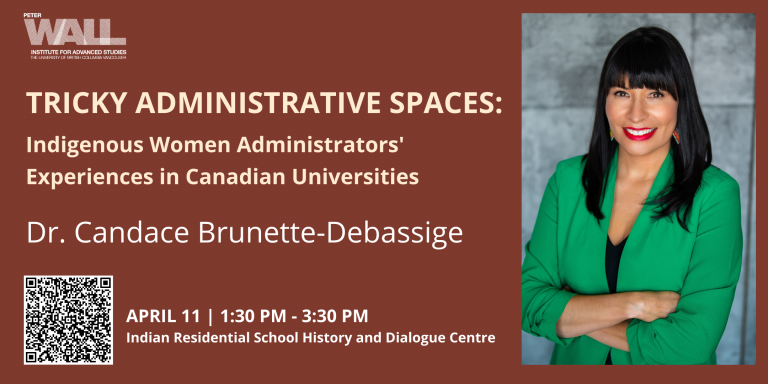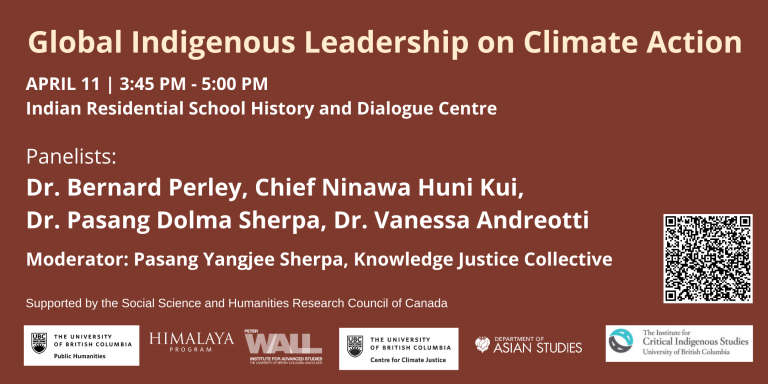 In face of intensifying social and ecological crises, this conference asks how we might navigate colonial institutions – from universities to the UN – in ways that question their presumed benevolence and continuity while also mobilizing their resources to reduce harm and support the creation and revitalization of other possibilities for collective existence. Can we find space in the cracks of these institutions to, in the words of conference co-organizer Pasang Yangjee Sherpa, find new ways of living together in the midst of dying?
In face of intensifying social and ecological crises, this conference asks how we might navigate colonial institutions – from universities to the UN – in ways that question their presumed benevolence and continuity while also mobilizing their resources to reduce harm and support the creation and revitalization of other possibilities for collective existence. Can we find space in the cracks of these institutions to, in the words of conference co-organizer Pasang Yangjee Sherpa, find new ways of living together in the midst of dying?
Photo by Sonam Choekyi Lama
_________________________________________________________________________________________
Conference Program
1:30pm-2pm: Welcome remarks
2:00pm-3:30pm: SESSION 1 – Tricky Administrative Spaces: Indigenous Women Administrators’ Experiences in Canadian Universities
Keynote by Dr. Candace Brunette-Debassige
Moderator: Dr. Sharon Stein
3:30pm – 3:45pm: Break (Refreshments will be provided)
3:45pm – 5:00pm: SESSION 2 – Global Indigenous Leadership on Climate Action
Panelists: Dr. Bernard Perley, Chief Ninawa Huni Kui, Dr. Pasang Dolma Sherpa, Dr. Vanessa Andreotti
Moderator: Pasang Yangjee Sherpa, Knowledge Justice Collective
More Info

April 11, 2023, 2:00pm-3:30pm
Keynote: Dr. Candace Brunette-Debassige
Moderator: Dr. Sharon Stein
Abstract:
The Truth and Reconciliation Commission in Canada (TRC, 2015) has been an undeniably powerful force in raising Indigenous educational needs and voices in university change processes over the last eight years. At the same time, the Indigenizing policy movement has been accompanied a number of challenges for Indigenous people who see the performative nature and rhetoric around reconciliation discourses in the academy. Amidst increasing debate about the challenges, new senior administrative offices and positions have been instituted in many Canadian universities. These new leadership roles are frequently occupied by Indigenous women who, despite their increasing numbers, often find themselves working in tricky academic administrative contexts, dominated by white male settler structures and norms. This talk aims to explore some of the deeper and ongoing structural and ideological issues that limit institutional-Indigenization work in Canadian universities with a particular focus on the lived experiences of Indigenous women administrators striving to advance Indigenous educational sovereignty.
Bio:
Candace Brunette-Debassige is a Mushkego-ininew iskwew and member of Albany First Nation with both Cree and French lineage. She currently serves as an Assistant Professor and Teaching Fellow in the Faculty of Education at Western University. Brunette-Debassige was the recipient of the George L. Geis Dissertation Award by the Canadian Society for the Studies in Higher Education (CSSHE) in 2021 and the Outstanding Scholarship for Emerging Scholar by the International Leadership Association (ILS) in 2022. Beyond her scholarship, Brunette-Debassige brings over twenty years of experience working in Indigenous education at K-12 and postsecondary levels. At Western, she has served as Acting Vice Provost /Assistant Vice President (Indigenous Initiatives), Special Advisor to the Provost (Indigenous), and Director of Indigenous Student Services. Brunette-Debassige’s teaching and research centers on the liberatory needs of Indigenous Peoples in Euro-Western colonial educational settings in Canada.

SESSION 2 – Global Indigenous Leadership on Climate Action
April 11, 2023, 3:45pm-5:00pm
Panelists: Dr. Bernard Perley, Chief Ninawa Huni Kui, Dr. Pasang Dolma Sherpa, Dr. Vanessa Andreotti
Moderator: Pasang Yangjee Sherpa, Knowledge Justice Collective
Panelists:
Dr. Bernard Perley
Dr. Perley is Maliseet from Tobique First Nation, New Brunswick. He is the director of the Institute for Critical Indigenous Studies at UBC. Dr. Perley’s research and advocacy focuses on the critical analysis of discourses to shift metaphors of “language death and extinction” toward metaphors of “language life and vitality”. He asserts an Indigenous praxis of “emergent vitality” as an empowering stance for communities who are working toward language life. His ongoing writing, research, and teaching integrates language, landscape, and identity to enhance Indigenous language revitalization.
Chief Ninawa Huni Kui
Chief Ninawa Huni Kui is a hereditary leader of the Huni Kui people, a Wall International Indigenous Scholar, and the elected President of the Huni Kui federation of the State of Acre, in the Amazon region. He represents 118 communities and a population of more than 15,000 people. The Huni Kui Indigenous people are part of the Amazon rainforest and put their lives on the line to protect it. Chief Ninawa has been a strong voice against false solutions to the climate crisis and a global advocate for placing Indigenous rights and lives at the centre of the climate and nature emergency agenda.
Dr. Pasang Dolma Sherpa
Pasang Dolma Sherpa is the Executive Director of Center for Indigenous Peoples’ Research & Development (CIPRED). She has been working with Indigenous Peoples, Women, and Local Communities for the recognition of Indigenous peoples’ knowledge, cultural values and customary institutions that have contributed towards sustainable management of forest, ecosystem, biodiversity and climate resilience. Dr. Sherpa’s doctoral research (2018) at Kathmandu University focused on Climate Change Education and its Interfaces with Indigenous Knowledge. She has served as the Co-Chair of International Indigenous Peoples’ Forum on Climate Change (IIPFCC), the Co-Chair of Facilitative Working Group (FWG) of Local Communities and Indigenous Peoples’ Platform (LCIP) of the United Nations Framework Convention on Climate Change (UNFCCC), and on the board of UN-REDD, Participant Committee of FCPF, World Bank. Presently, she is the Chair of IUCN CEESP Specialist Group on Indigenous Peoples’ Customary and Environmental Laws and Human Rights (SPICEH), visiting faculty at Kathmandu University, and continues to serve as a representative in different forums, networks, and institutions at national and international levels.
Dr. Vanessa Andreotti
Dr. Andreotti is currently the Interim Director of the Peter Wall Institute for Advanced Studies at UBC. In July 2023, she will start her appointment as Dean of the Faculty of Education at the University of Victoria.
Dr. Andreotti is a former Canada Research Chair in Race, Inequalities and Global Change and a former David Lam Chair in Multicultural Education. She is the author of Hospicing Modernity: Facing humanity’s wrongs and the implications for social activism (2021) and one of the co-founders of the Gesturing Towards Decolonial Futures (GTDF) Arts/Research Collective. Most of her published articles and OpEds are available at academia.edu.
Recordings will be made available after the event.
This conference is co-sponsored by: Center for Climate Justice (CCJ), Institute for Critical Indigenous Studies (CIS), Department of Asian Studies, Peter Wall Institute for Advanced Studies (PWIAS), Himalaya Program, Public Humanities Hub (PHH), Social Science and Humanities Research Center (SSHRC).